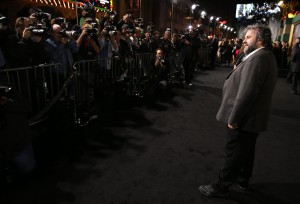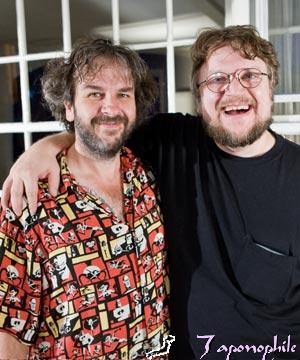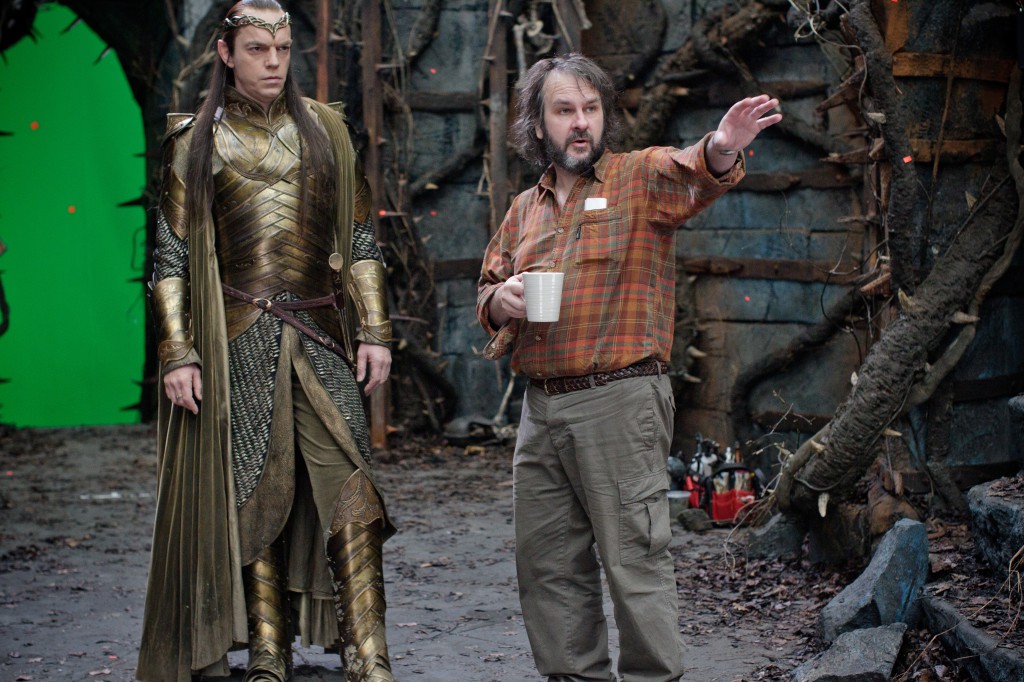CUTTING REMARKS
“Now, in every film I’ve ever made, scenes get cut because you tend to write more than what you really need.”
But fans, many fans, feel that Jackson’s extended editions of the films are the definitive ones.
“It may be a brilliant, beautiful scene and yet it’s just irrelevant. You can do without it so you usually get to a stage in a film where you need to cut time out and you just have to look for what you can do without.”
But that doesn’t mean he shoots with the extended scene in mind.
“…as far as I’m concerned everything we’re shooting is for the movie — for the theatrical movie,” he said. I probe to make sure he meant that and that I understood it. I look for a contradiction but don’t get one.
 “I mean, they are all very legitimate scenes that exist in the body of the story. We don’t shoot them as being bonus scenes, we don’t shoot them knowing that they’re going to be in an extended cut at all. We just end up trying to shave running time off the movie and get those bits whether they’re short or long or just fragments or entire sequences, those pieces can — I always love putting them back again because it pains me to take anything out. The extended cuts have reduced that pain.”
“I mean, they are all very legitimate scenes that exist in the body of the story. We don’t shoot them as being bonus scenes, we don’t shoot them knowing that they’re going to be in an extended cut at all. We just end up trying to shave running time off the movie and get those bits whether they’re short or long or just fragments or entire sequences, those pieces can — I always love putting them back again because it pains me to take anything out. The extended cuts have reduced that pain.”
It wasn’t an exaggeration to say that as an interviewer in the tent, literally outside the ruins of the gates of Dale, I was hyper aware of time. I was delighted by Jackson’s transparent answers but I knew a few long answers meant it would cost me some questions. There were essential, “must ask” themes but I was thrilled when the conversation turned to the extended editions of the films. Fans want to know about them but journalists from more mainstream publications might not even be aware of them. The EEs are a bit of a passion concept for me but if I didn’t ask, maybe nobody would.
As TheOneRing.net readers and careful watchers of the LOTR DVDs know, there is much more material conceived and shot for the fabled “Ultimate Version” of the Rings films. While Jackson may feel differently now than he did during the shoot, he was happy to entertain the idea of revisiting what I think of as the mythical, rainbow-colored-unicorn-edition, with the architect of the extended home video content on Jackson’s movies, Michael Pellerin, a great filmmaker on his own, working in tandem with Jackson.
THE HOBBIT MOVIE — SURPRISE!
I wondered, if during the long shooting process, there was anything new for the man who had the grand concept, put together the production, co-wrote the script, approved everything along the way, cast the actors and then shot the film. So, any surprises?
 “There always are,” Jackson said. “What is always surprising is what everybody else brings to the process so you know, in order to imagine my version of the scene, I have to essentially design the set to figure out where everyone’s going to be before I can put it together and so I do, I sort of do that in my head.” (Um, wow!)
“There always are,” Jackson said. “What is always surprising is what everybody else brings to the process so you know, in order to imagine my version of the scene, I have to essentially design the set to figure out where everyone’s going to be before I can put it together and so I do, I sort of do that in my head.” (Um, wow!)
“When Alan Lee and John Howe and Dan Hennah come on board, their sets always look a hell of lot better than the ones that were in my head and then when Ian and Martin and everyone is doing the performances, they’re bringing things into it that I never imagined in my vision of the film. So, you know, my little imaginary version that I paste together always gets built on and improved by the contributions of everyone else and that’s what’s exciting.
“That’s what makes every day different because there is never a day where you literally show up and you’re just shooting what you had in your head. You have a thing in your head but you can never actually duplicate that and the idea is to try to improve it.
“So you’re always looking for opportunities to make it better and one of the things I always try and do when I’m looking at the monitors and directing and we’re in the middle of a scene and we’re in the middle of shooting a shot — the thing that I’m always saying to myself is now what could we do to improve this? What can we do to improve it? How do we make it better? And anything that I give in way of a direction to an actor or a cameraman is because I’m trying to think of ways to improve what I’m seeing and so it’s always sort of trying to push, push, push all the time.”

Most readers will know Jackson and company are infamous for changing scripts overnight. This isn’t standard filmmaking practice — far from it — so why?
“(It’s) just wanting to make the film as good as we can.
“To me it’s a no-brainer. You write something a year ago, you pick it up today and you think, ‘Well you know we thought this was good at the time but we got a lot more ideas now and we can make it a lot better.’ You know I think you’re insane if you think a script is finished and it sits as a sort of a monument to 18 months ago when it was originally written.
“It should be organic, it should develop and change and adapt to the flow of the film. We see characters and moments coming to life in scenes that we shoot and we think wow, we could do more with that character or we could do more with that tension that’s building or we could do more with that and so we’re kind of always adapting the script to sort of the flow of what we’re shooting to kind of keep pushing it and making it as good as it can be.”
And then Jackson talks about something that makes him different from virtually every director in Hollywood while speaking of the ever evolving script.
“They’re not always new scenes but sometimes you’re expanding a scene or you’re bringing a new character into a scene that wasn’t originally in the scene. It and it keeps someone like Caro (Carolynne Cunningham, First Assistant Director) on her toes all the time, because you know it is a very organic process — films are not supposed to be. You’re supposed to lock off your script, do your schedule, do your budget and that’s what you shoot but that’s not the way that Fran and I work. We just never had worked like that.”



